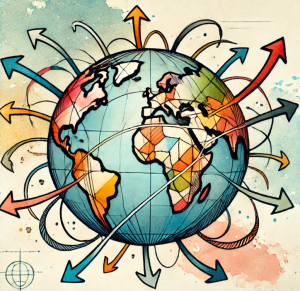
Rethinking Science Diplomacy
Imagine a young scientist from Nigeria brimming with innovative ideas to combat malaria in their community. Despite their expertise and unique perspective, they’re sidelined in global research projects dominated by Western agendas. This scenario isn’t hypothetical—it’s a recurring reality shaped by systemic inequities in science diplomacy.
How can we transform science diplomacy into a force for equitable collaboration, ensuring all voices are heard?
Unequal Foundations: The Legacy of Colonialism
Science diplomacy—the practice of leveraging science for international relations—has long promised a bridge between nations. Yet, its foundations often reflect the colonial legacies that divide the Global North and South. These imbalances manifest in how research is conducted, funded, and utilized:
- Diplomacy for Science: Global North institutions dominate international research partnerships, often shaping agendas to align with their priorities.
- Science for Diplomacy: Western nations wield science as soft power, projecting their values and interests under the guise of collaboration.
- Science in Diplomacy: Scientific expertise influences policies, but whose expertise matters most? Historically, it’s been those from the North.
This framework, while well-intentioned, frequently perpetuates inequities. For example, the COVID-19 pandemic exposed glaring disparities in vaccine access, testing, and implementation strategies, disproportionately affecting the Global South.
The Pain of Extraction: Stories from the Field
Researchers from the Global South often face extractive practices where their communities’ knowledge and resources are utilized without meaningful reciprocity. One poignant example involved a Western researcher studying cultural practices around menstruation in a migrant community. Instead of amplifying the voices of local researchers, the study framed these practices through a judgmental Western lens, further marginalizing the community.
This kind of “research colonialism” doesn’t just hinder progress—it actively harms communities by reinforcing power imbalances.
To level the playing field, we must center local voices in research and policy development. A young scientist from the Global South deserves not only a seat at the table but also an equal voice in shaping the agenda.
Science Diplomacy in Action: Lessons from the Pandemic
The COVID-19 pandemic serves as both a cautionary tale and a call to action. Global response strategies often ignored the lived realities of low-income countries:
- Lockdowns: Broadly recommended by international organizations, these measures failed to consider population density and cultural norms in many Global South countries.
- Vaccines: While wealthy nations hoarded supplies, countries in the South were left scrambling for access, highlighting systemic inequities in global health governance.
These failures underscore the urgent need for a science diplomacy model that prioritizes equity and inclusivity.
A New Framework for Equity
How can science diplomacy truly reflect the values of equity and inclusivity? Here are three actionable strategies:
- Center Local Knowledge and Expertise:
- Use participatory methods like fuzzy cognitive mapping or Bayesian belief networks to ensure research is co-designed with local communities.
- Recruit diaspora scientists to bridge gaps between local expertise and global platforms.
- Challenge Power Dynamics:
- Move away from top-down, patronizing approaches. Instead, adopt grassroots collaborations that empower communities as equal stakeholders.
- Advocate for ethical guidelines that respect cultural and religious values, ensuring all voices are represented in decision-making.
- Align Key Sectors for Impact:
- Strengthen coordination between universities, governments, and industry to avoid fragmented efforts.
- Create funding mechanisms that prioritize long-term, locally driven projects over one-size-fits-all solutions.
One example of success is a participatory study in Jordan that used visual mapping to empower Syrian refugee women. By involving the community at every stage, the project fostered authentic knowledge-sharing and actionable outcomes.
The Way Forward: Bridging the Action Gap
Despite promising rhetoric, many initiatives fall short in translating equitable policies into action. Financial cuts, like those to the UK’s Global Challenges Research Fund (GCRF), exacerbate vulnerabilities in the Global South, leaving projects underfunded and researchers unsupported.
To move forward, we must:
- Embrace Multilateral Partnerships: Collaborations must be inclusive, reflexive, and grounded in shared governance.
- Fund Grassroots Solutions: Prioritize projects that are co-created with local stakeholders, ensuring equitable resource distribution.
- Rethink Metrics of Success: Shift from outputs (e.g., publications) to outcomes that improve real-world conditions for marginalized communities.
- Create Avenues for Real Collaboration. Recently, the Global Implementation Society held its biennial summit in Abuja, Nigeria—the first time this conference was held in the global south. Hundreds of researchers came together to explore the value of implementation science in improving outcomes across multiple sectors and boundaries. This is a clear example of contributing to the overall decolonization effort by tangible participation in international efforts.
What’s Next?
The path to equitable science diplomacy is neither easy nor linear, but it is necessary. Key questions for future exploration include:
- How can funding models better reflect the needs of the Global South?
- What role can education and capacity-building play in fostering local scientific leadership?
- How can we ensure accountability in global collaborations?
By addressing these challenges head-on, we can transform science diplomacy into a vehicle for justice, inclusion, and innovation.
Join the Conversation
What steps can public health practitioners take to ensure equity in global research? Have you witnessed or experienced inequities in science diplomacy? Share your thoughts and stories in the comments or on social media.
Let’s build a future where science truly serves everyone—equally.



